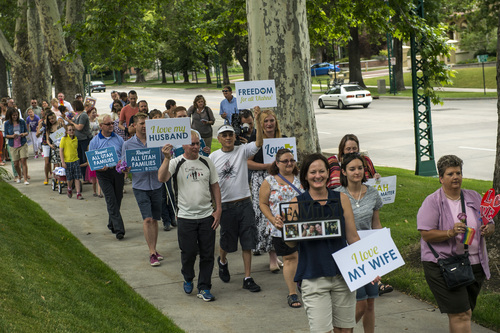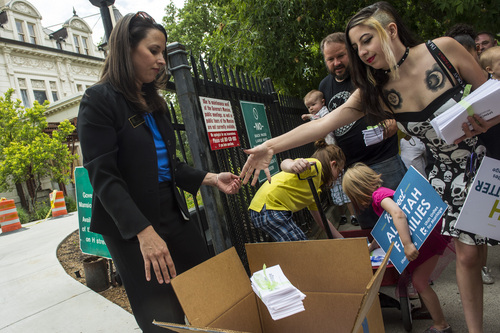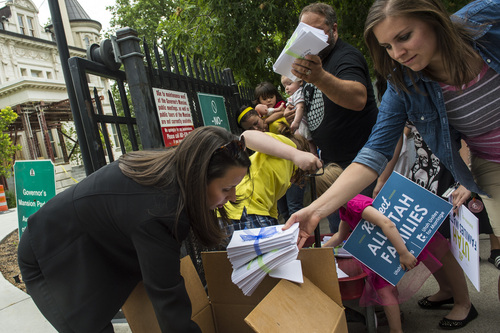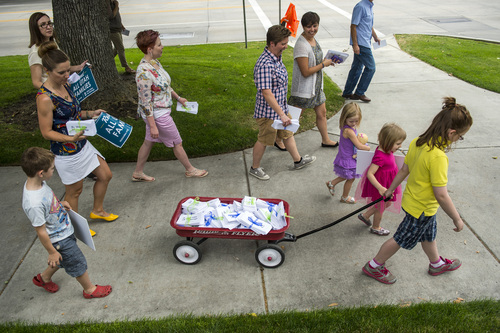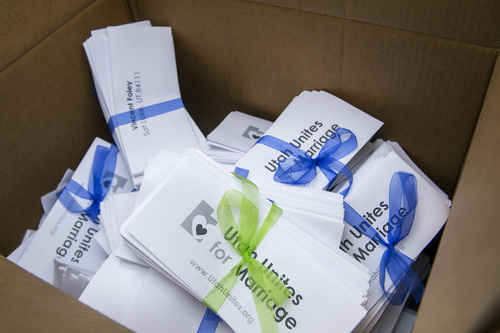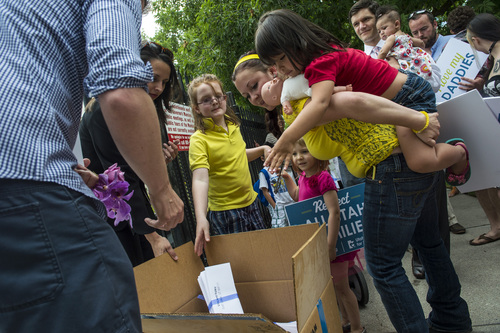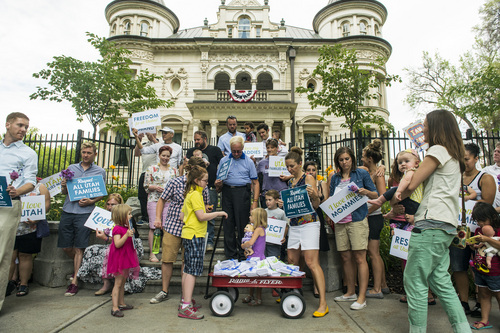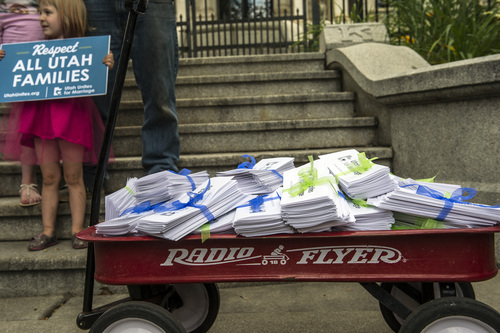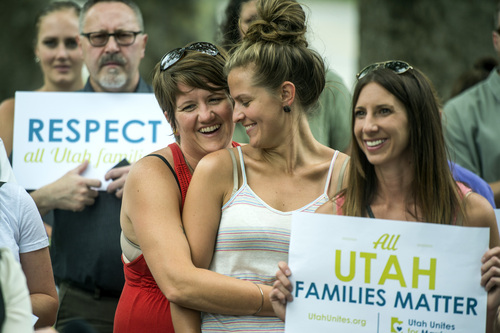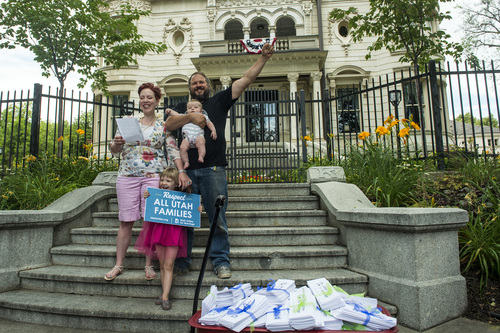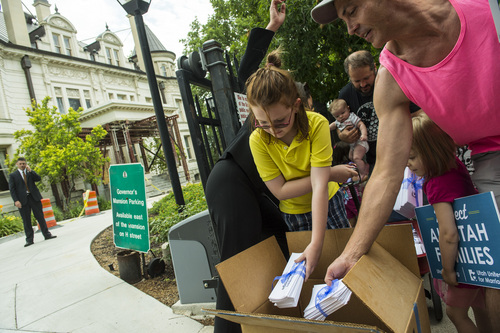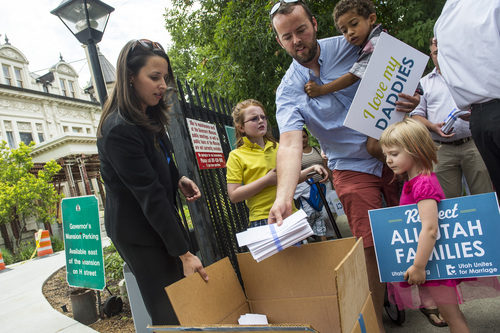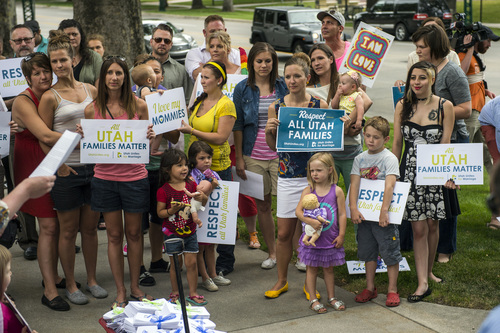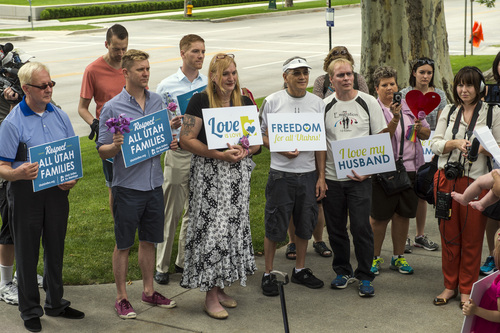This is an archived article that was published on sltrib.com in 2014, and information in the article may be outdated. It is provided only for personal research purposes and may not be reprinted.
The letters were tied with blue and green ribbons, piled high in a little red wagon and pulled to the Governor's Mansion by children to whom the words "Amendment 3" mean nothing.
Weston Clark and his husband, Brandon Mark, explained what they were doing Wednesday to 4-year-old Xander in simpler terms:
"Do you love our family?" the men asked their son, who nodded. "Well, then we have to fight for it."
They were among several Utahns who hand-delivered more than 3,800 signed letters to Gov. Gary Herbert and Attorney General Sean Reyes, asking the state to end its push to revive a voter-approved ban on same-sex marriages.
But, moments after the letters were delivered, the state announced it would do no such thing.
Utah will go to the U.S. Supreme Court to challenge a federal appeals court's ruling that upheld same-sex marriage, calling state bans on such unions unconstitutional.
Wednesday was Utah's deadline to seek a full-court review by all 12 judges on the 10th Circuit bench, also known as an en banc review.
But, according to a statement from the attorney general's office, the state will instead push onward to the U.S. Supreme Court.
"To obtain clarity and resolution from the highest court, the Utah Attorney General's Office will not seek en banc review of the Kitchen v. Herbert Tenth Circuit decision, but will file a Petition for Writ of Certiorari to the United State Supreme Court in the coming weeks," the attorney general's office wrote in a statement. "Attorney General Sean Reyes has a sworn duty to defend the laws of our state. Utah's Constitutional Amendment 3 is presumed to be constitutional unless the highest court deems otherwise."
Attorney Peggy A. Tomsic, who represents the three plaintiff couples in the Kitchen case, said they, too, had hoped the state would decide not to appeal the case.
Upon hearing the news Wednesday, however, she said, she was not surprised.
"The thing that our plaintiffs and we are very thankful for is we now know what course the state is going to take," Tomsic told The Tribune. "My genuine hope was that the attorney general and the governor would make a decision not to appeal. ... Our objective from day one was to try to expeditiously get this matter resolved so we could stop the discrimination and unequal treatment of same-sex families in Utah and, now, other states in the 10th Circuit."
The appeals court's June 25 ruling extends to Colorado, Kansas, New Mexico, Oklahoma, Utah and Wyoming.
By upholding U.S. District Judge Robert J. Shelby's landmark decision, the three-member panel of the 10th Circuit Court of Appeals in Denver became the first federal appeals court in the nation to declare that voter-approved bans on same-sex marriage violate the 14th Amendment rights of same-sex couples to equal protection and due process.
In order to give Utah time to file its widely anticipated appeal, the court immediately stayed the implementation of its ruling.
The 10th Circuit split along lines that appeared to form during oral arguments in April, with Paul J. Kelly siding with the state and Carlos F. Lucero and Jerome A. Holmes affirming the plaintiffs' "fundamental right" to marriage.
The court's majority opinion focused on the 14th Amendment, which guarantees equal protection under law to all American citizens. The court wrote that its reading of the Constitution shows that couples' right to marriage has nothing to do with the gender of those in the union.
"We hold that the Fourteenth Amendment protects the fundamental right to marry, establish a family, raise children, and enjoy the full protection of a state's marital laws. A state may not deny the issuance of a marriage license to two persons, or refuse to recognize their marriage, based solely upon the sex of the persons in the marriage union," the appellate court said.
"Courts do not sit in judgment of the hearts and minds of citizens."
Kelly, who authored a dissenting opinion, took issue with the characterization of marriage as a "fundamental right."
"The Constitution is silent on the regulation of marriage; accordingly, that power is reserved to the states," he wrote. "Marriage is an important social institution commonly understood to protect this and future generations. That states differ about the best way to do this (including whether to extend marriage to same-gender couples) is inevitable."
This dissent mirrored closely the state's argument that defining marriage as a union between one man and one woman is a state's right, exercised to benefit and protect children.
But families at Wednesday's rally before the Governor's Mansion said if the state wants to protect all families, it should withdraw its appeal of the Kitchen case, as well as its opposition to another lawsuit brought by several of the more than 1,000 same-sex couples who wed during a 17-day window when such unions were legal, challenging the state to recognize their marriages.
"It's time for the governor and the attorney general to stop hurting Utah's families," said Crystal Young-Otterstrom. "Utah has lost at every single turn when courts and judges have had a chance to evaluate whether excluding LGBT families from marriage is allowed under our country's or our state's Constitution. Pushing this narrow view on what it means to be a family sits in deep conflict with our shared community values of fairness, love and freedom for all people."
Young-Otterstrom and her husband, Joel Otterstrom, both members of The Church of Jesus Christ of Latter-day Saints, said they want their two young children to grow up in a state where different families are treated equally.
"Some of [our kids'] friends have two daddies and some have two mommies," Young-Otterstrom said. "It doesn't really make a difference."
As she and other Utah families stood before the small crowd to speak, supporters held tight to photos of their families, to signs calling for love and acceptance, and to each other.
Candice Green-Berrett and her wife Megan Berrett passed their 10-month-old daughter Quinn back and forth as they explained that despite the state's ardent defense of its same-sex marriage ban, they remain hopeful that change will come.
The U.S. Supreme Court is not obligated to hear Utah's appeal — or any case regarding state same-sex marriage bans.
Should the justices decline to hear such a case, the rulings of lower courts, like that of the 10th Circuit Court of Appeals, would stand as the law of the land.
"We don't really know if the Supreme Court will take this up or they won't," said Equality Utah Executive Director Brandie Balken, who attended Wednesday's march. "Unfortunately, today we have families, couples, children who are living in legal limbo."
Charles A. Stormont, who is the Democratic candidate opposing Reyes in his bid for the office of attorney general, said if he were Utah's top prosecutor, he would immediately drop the case against same-sex marriage.
"This appeal is an enormous waste of money and we should be fighting to protect people's rights, not to take them away," Stormont said in a statement. "The state has no business dictating how people build their families, and the State should never tell children or their parents that they are second-class citizens."
Twitter: @Marissa_Jae —
A time line of Utah's same-sex marriage saga
Nov. 2, 2004 • Utah passes Amendment 3, which states that "marriage consists only of the legal union between a man and a woman."
March 25, 2013 • Three couples file a lawsuit alleging Utah's Amendment 3 violates the 14th Amendment to the U.S. Constitution.
June 26, 2013 • The U.S. Supreme Court strikes down the Defense of Marriage Act, which barred gay marriage, and declines to rule on California's Proposition 8, clearing the way for same-sex marriage in the Golden State.
Dec. 20, 2013 • U.S. District Judge Shelby strikes down Utah's Amendment 3 as unconstitutional, opening the door to same-sex marriage in the state. More than 1,000 same-sex couples obtain marriage licenses during the next 17 days.
Jan. 6, 2014 • The U.S. Supreme Court grants the Utah Attorney General's Office request for a stay, ending same-sex marriage in Utah pending the 10th Circuit Court outcome of the state's appeal of Shelby's ruling.
March 12, 2014 • Utah decides to place same-sex marriages performed before the stay "on hold," rather than fully recognize or refuse to recognize them.
May 19, 2014 • U.S. District Judge Dale A. Kimball orders Utah to honor and recognize all same-sex marriages performed while Judge Shelby's ruling was in effect.
June 6, 2014 • The 10th Circuit Court of Appeals temporarily stayed Kimball's ruling, halting any movement toward marriage recognition. (The case remains on hold.)
June 25, 2014 • The 10th Circuit Court of Appeals rules that states outlawing same-sex marriage are in violation of the U.S. Constitution, but the court issues an immediate stay to its own ruling, anticipating an appeal by Utah to the U.S. Supreme Court.


